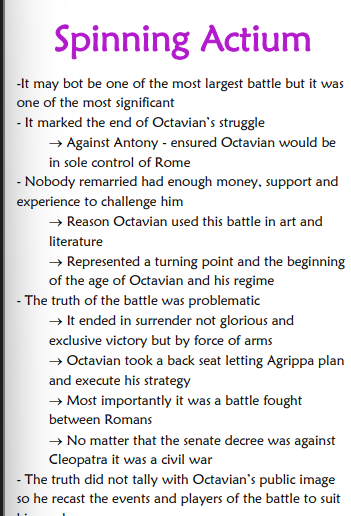Imperial Image
1/133
Earn XP
Description and Tags
I WILL BE DELETING THIS SET AT THE START OF JULY 2025
Name | Mastery | Learn | Test | Matching | Spaced |
|---|
No study sessions yet.
134 Terms
Who said "it is tempting to feel we are closer to the emperor as a human individual" and give context.
Edwards - Seeing emperors as us
Who said that such descriptions of people (e.g. Suetonius biography of Augustus) "serve as an important indication of the moral character and the political ambitions of the individual described" - Give context
Edwards

Who said that Augustus' behavior was "influenced by late republican ideas"?
Edwards - what was Augustus’ behaviour influenced by
Who said "Augustus did not pursue novelty in his living arrangements" + give context.
Edwards
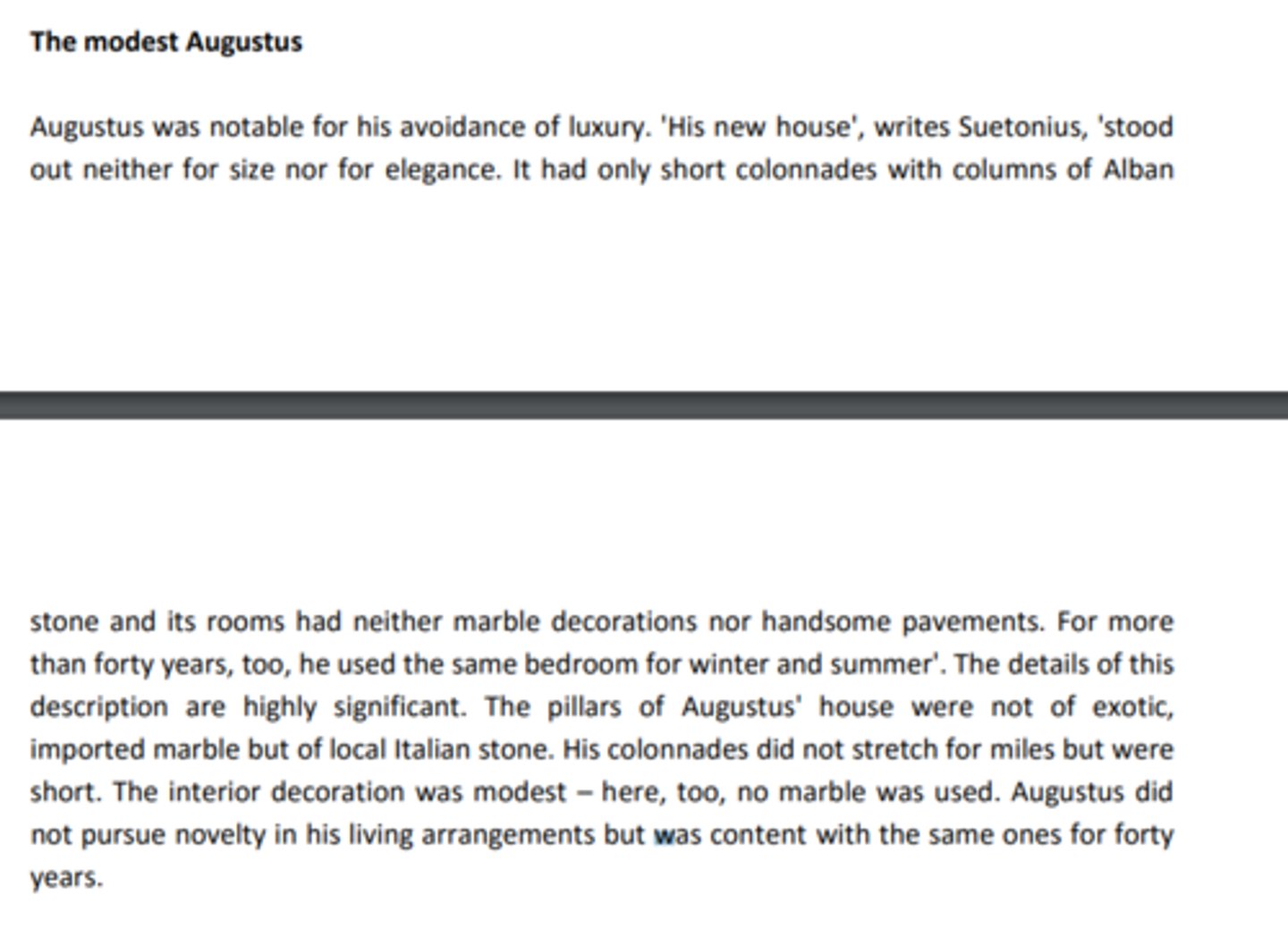
Who said "Augustus often built lavishly – but only when the buildings were for public use."?
Edwards - Augustus building lavishly
Who said "Moralists of the late republic often criticised aristocrats for their excessive interest in Greek culture"
Edwards - Moralists criticising aristocrats for what
Who said Augustus aimed to associate himself with "a return to the values of the early republic.
Edwards
Who said "Augustus' women-folk did not spend their days idly" and give context.
Edwards

Who said "Suetonius' description emphasises that the emperor shared the tastes of the common people" and give context.
Edwards.

Who said "Some of the stories told by Suetonius appear to put the emperor in a bad light."
Edwards - Augustus portrayed in a bad light
Give some examples of the misdemeanors of Augustus from Suetonius writings.

Who said "'Good' and 'bad' emperors are perhaps not so easy to tell apart"?
Edwards - Good vs bad emperors
Who said "who could suspect him of abusing his power when he wore homespun togas and ate brown bread?"
Edwards
Who said the Res Gestae "offers an impression of how he (Augustus) wanted to be remembered and what he wanted to be viewed as his main achievements"
Cooley - what the res gestae offers - impression of ____
Who said that one of the problems in approaching the Res Gestae is "detecting historical bias"
Cooley - Historical bias about the Res Gestae
Who called Augustus' mausoleum a "dynastic monument"
Cooley - on augustus mausoleum
Give a quote from Cooley about the obelisks at the Mausoleum of Augustus.
they are "an allusion to the capture of Egypt"
Who said that the roll call of exotic names in the Res Gestae "contrasts with the lack of Roman names"
Cooley - Exotic names in the res gestae
Who said that one of the messages that came out of the Res Gestae was that "Augustus had conquered the world"?
Cooley
The whole world, not just their area
Who said there's "subtext in the Res Gestae of Augustus pointing the finger at Alexandar (the great)" + give context.
Cooley

Give a quote from Cooley about the relationship between Augustus and Alexander.
"you've got this nice parallelism and competition going on"
Who said "Augustus is the first person in Roman history to be a member of every single major priesthood"?
Cooley - Augustus being a member of priesthoods
Give some backround info to Augustus claiming the title 'princeps'.
To characterize his power, he adopted the term princeps (“chief, leader”), which had long been applied to senators with the highest prestige and influence, but such circumlocutions only thinly masked the fact that Augustus, and Augustus alone, controlled all the most crucial areas of Roman government:
Give some backround info to Augustus having Tribunician Power.
In 23 BCE he was granted permanent tribunicia potestas, including the tribune's traditional right to introduce legislation, to veto other magistrates, to compel citizens to obey his orders, and to protect the common people.
From this time on, he used this office rather than the consulship to legitimate the actual supreme power that he wielded.
Give some backround info to Augustus having military power.
Since 36 BCE, he had enjoyed the tribune's sacrosanctity (state protection of his life and person), and in 23 BCE he was granted permanent tribunicia potestas, including the tribune's traditional right to introduce legislation, to veto other magistrates, to compel citizens to obey his orders, and to protect the common people. From this time on, he used this office rather than the consulship to legitimate the actual supreme power that he wielded.
Give some backround info to Augustus having financial control and divulging in foreign affairs.
Besides controlling his immense personal wealth (acquired especially through conquest of Egypt and other territories), Augustus reorganized state finances so that most state revenues and taxes were under the control of the princeps
Foreign Affairs: His military and financial powers gave him control of treaties, wars and relationships with other governments.
Give some backround info to Augustus having administrative control.
Augustus reorganized the state bureaucracy, staffing crucial offices in the city and provincial administrations, in the lawcourts, and in the military with senators, equestrians, and even the slaves and freedmen of his own household, all of whom owed their positions to him.
Although traditional Republican magistrates such as consuls and praetors were still elected, candidates did not run for office without his approval.
He controlled the old Republican competition for political rank and status by channeling it into a more orderly, step-by-step advancement through reconfigured or newly created offices, so that there were more offices and more opportunities for public display, but very little chance of achieving the kind of power (i.e., military) that had destroyed the older form of government.
In other words, he crystallized symbols of rank and status, thus increasing social prestige for many elite Romans, though their actual political power was lessened.
Give some backround info to Augustus creating family honour.
He persuaded the Senate in 35 BCE to set up public statues to his sister Octavia and his wife Livia and to grant them sacrosanctity, a heretofore unprecedented extension of state protection to women.
He continued the policy by bestowing special honors, titles, and public offices on his grandsons and heirs apparent (as in this coin depicting Julia flanked by Gaius and Lucius) even when they were still boys.
This policy was apparently part of his effort to secure the succession of imperial power for a family member without appearing to create an imperial dynasty, but it was also a way to emphasize the concept of family honor, with the imperial family the most honorable of all.
How did Augustus associating himself with Caesar benefit his career and what problems did he face?
In the early years of Augustus political career, he sought to establish a close relationship between himself and Caesar in the minds of the public.
This gave him viability and enabled him to 'borrow' Caesars popularity with the urban poor and army. Also lent him the aura of a great general due to Caesars military victories.
Now that Augustus was in sole command, he was ready to distance himself from the memory of Caesar so that people didn't start thinking of him as a tyrant.
Unfortunately, Caesar had become such a key part of Augustus identity that he wouldn't have been able to divorce himself from Caesar with much success.
How did Augusts separate Caesar from himself? (propaganda etc)
Augustus shifted the focus of his own propaganda from stressing their irl relationship to his relationship with Caesar the god.
As a man, Caesar had done many terrible things and the association could've been a liability for Augustus. As a God, Caesar was beyond reproach. He was separated from his deeds and became a generic symbol for divinity.
Of course, Caesar had been thought of as divine since before his death but it wasn't until Augustus reign began, that he stopped depicting Caesar as a man entirely. Art and coinage pf the period frequently featured an eight point start with one long point
The star as used to symbolize Caesar the god, rather than his portrait to stress his divinity and encourage people to forget Caesar the moral man. Ovid's metamorphoses deals with this theme.
Who said that overgeneralization is "tempting for the biographer who wants to demonstrate character through habitual actions but which results in exaggeration" and who is it about?
Dr Wardle
About Suetonius
Who said Augustus tomb (mausoleum) played "an important role in the final propaganda battle against Anthony" and give context.
Cooley
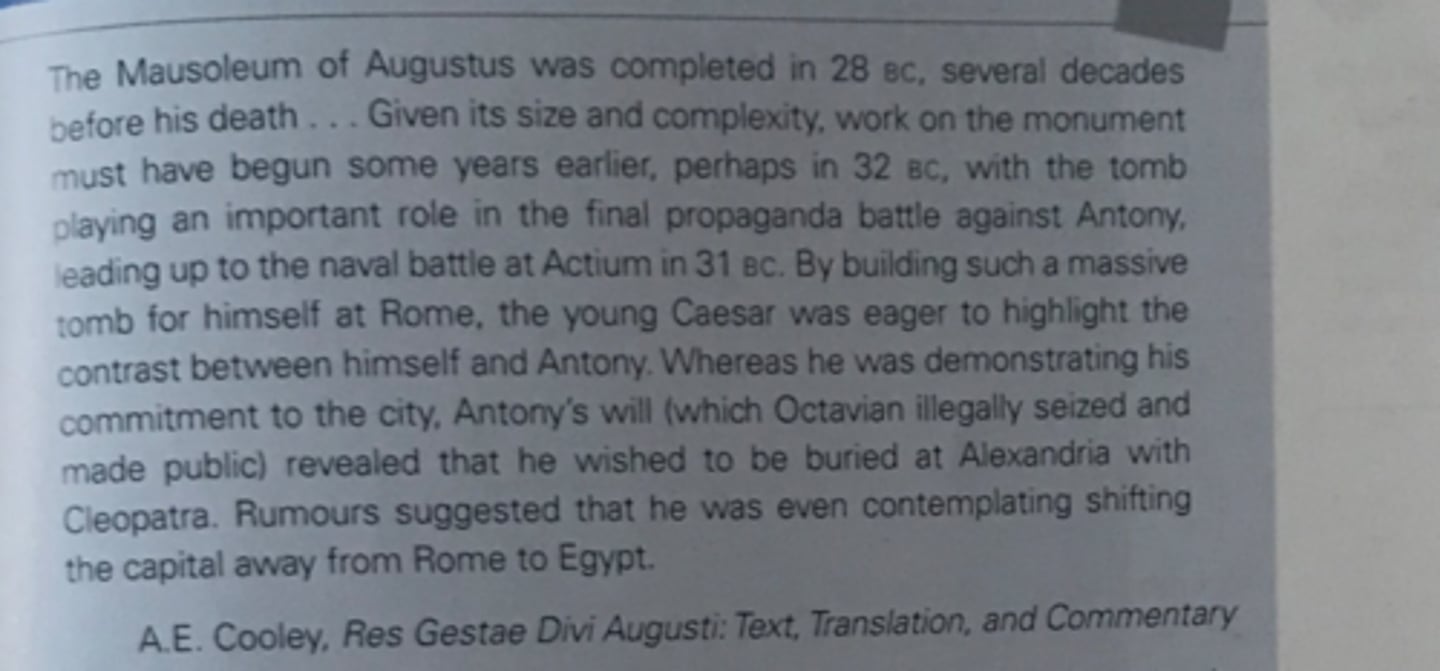
Who said "The relationship with Apollo would prove to be ideally suited to Octavian himself and to furthering his political image" and give context.
Zanker
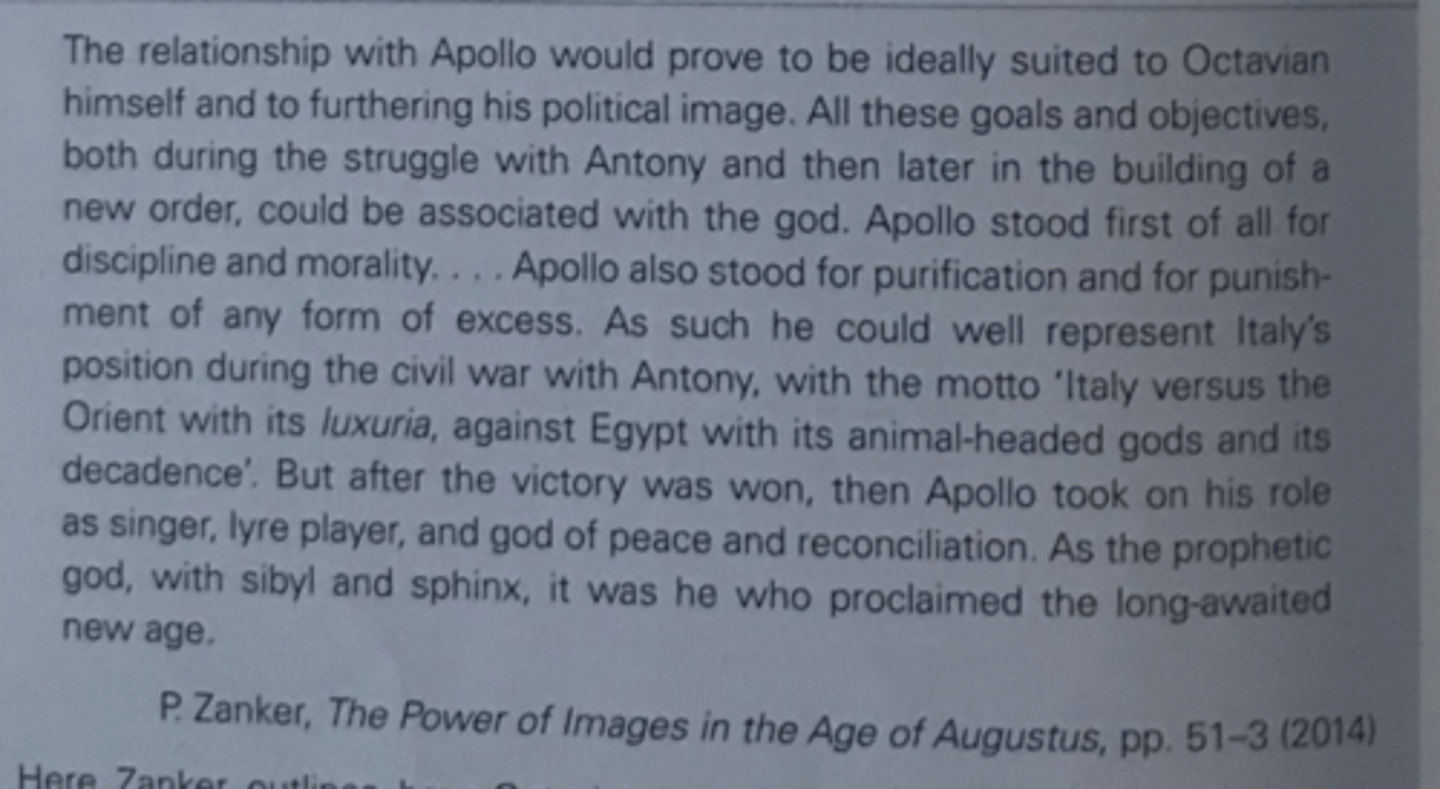
Who said that "even when he knew his cause was lost (Anthony) he remained in character, treating life as one great party" and give context.
Zanker
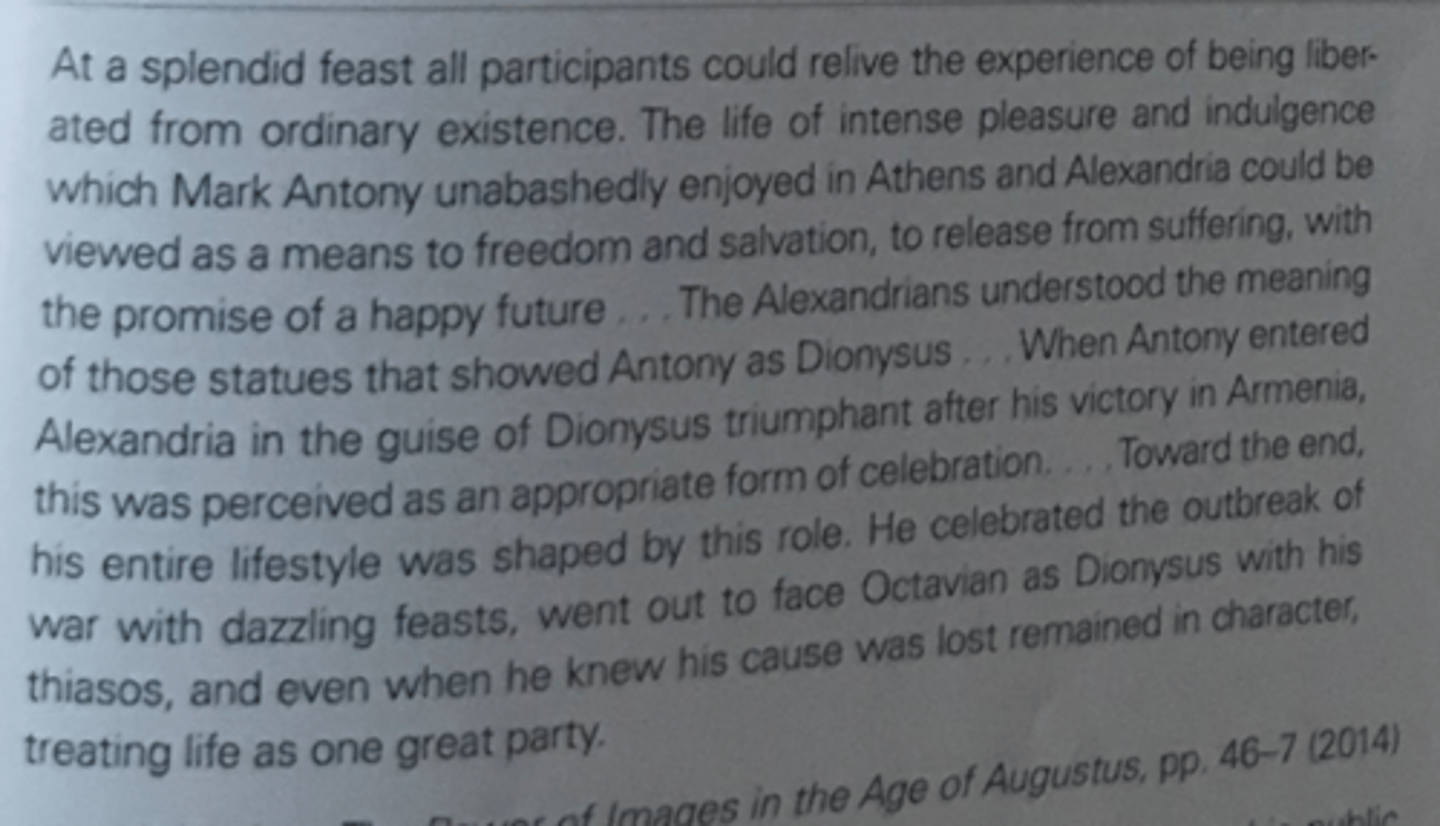
Who said the "elogia (res gestae) would hardly contain any direct untrue claims" and give context.
Moore

What are two common symbols in literature / architectural sources?
Comets - Caesar deification / Caesar himself
Eagles / Birds - Predict things
Who said "Rome's success was due to it's past leaders"?
Shaya
Who called Augustus never aging face (coinage etc) his "mask of power" ?
Mary Beard
Who said that statues, such as of Alexander the Great, "all have the same face" + meaning.
Jenkins
Godlike
Which scholar said "Augustus prefers to be allusive and indirect" ?
Galinsky
Augustus as a religious leader - Public affairs, religious custom, politicians religious involvement, Augustus image as a religious leader
Public affairs were closely tied to politics.
Custom dictated that rituals be fulfilled each year / every few years.
Prominent politicians and their families hold priesthoods such as Lepidus (Pontifex Maximus).
Augustus role as a religious leader was important for portraying himself / appealing to older conservatives who thought that Rome's recent troubles had been caused by neglecting the gods.
Also encouraged people to think he had a privileged relationship to Apollo + Caesar.
Augustus as a religious leader - Religious practice
Augustus was actively involved in religious practices. He was a member of almost every priestly college.
Revived several priestly colleges that had fallen out of observance.
Reformed traditional religious festivals such as the Lupercalia (cleanse the city of pollution + encourage fertility).
Augustus as a religious leader - Repairing temples
Starting in 28 BC, Augustus oversaw the repair of 82 temples in Rome. Highly symbolic act as repairing temples meant rejuvenation of Rome's religious devotion.
He also dedicated new temples to Jupiter, Minerva, Mars Ultor, Apollo etc.
The temple of Palatine Apollo opened in 28 BC across from his home. Particularly significant due to his personal relationship + devotion to this deity.
Did the idea of Augustus as a religious and moral leader endure beyond his lifetime? Explain.
The idea of Augustus as a religious and moral leader endured well beyond his lifetime.
Suetonius outlines his major accomplishments in his bio of Augustus.
His writings give the impression that Augustus building programme was both generous and extensive and that his influence on Roman religion was generally positive.
Augustus' Social and Moral reforms - Effectiveness of the social reforms - his own family, standards, his own reputation, application to time
Augustus' daughter + grand daughter Julia (elder + younger) were both exiled for adultery and or treason.
High moral standards applied to everyone.
Augustus most likely wanted to distance himself from their misdeeds and preserve his reputation.
However, these stories were re-told in Suetonius bio, carried over time.
Augustus' Social and Moral reforms - Sumptuary laws
These were laws against extravagance e.g. Lex Julia
These were previously tried unsuccessfully by Caesar.
The aim was to encourage the ideals of simplicity, religious rituals and qualities in line with Augustus values for Rome.
Augustus' Social and Moral reforms - The Ludi Saeculares
17 BC
This was a week long public ceremonial symbolizing end of conflict and commencement of a new era (saeculum).
The ceremony was based around family life and fertility. Revival of household gods.
Was Augustus worshiped like a God in the East?
In the East, where the distinction between ruler and god was less defined, Augustus was worshiped as a god but he didn't encourage this in Rome. Ruler worship in Egypt was a normal thing, Augustus accepted it because it helped them accept him as a ruler.
What is the Lex Julia?
18 BC
Augustus' Social and Moral reforms
Penalties for adultery introduced. The law of inheritance was to favour parenting.
There was also penalties for non-marriage as well as privileges for fathers of large families.
This law was intended to encourage respect for marriage and increase birthrate amongst the nobles.
Augustus' Social and Moral reforms - Lex Papia Poppaea
9 AD
Penalties for childlessness. Marriage was required by a certain age and widows were supposed to re-marry.
Having 3 or more children meant that it was easier to be promoted.
Was Augustus always successful in bringing new laws? Use Suetonius bio
These policies that he was really aiming for seem here to be unpopular.

Give info from Suetonius about Augustus fearing to be seen as a king.

Give info from Suetonius about Augustus seeming kind to people. Not all tyrannical leader.
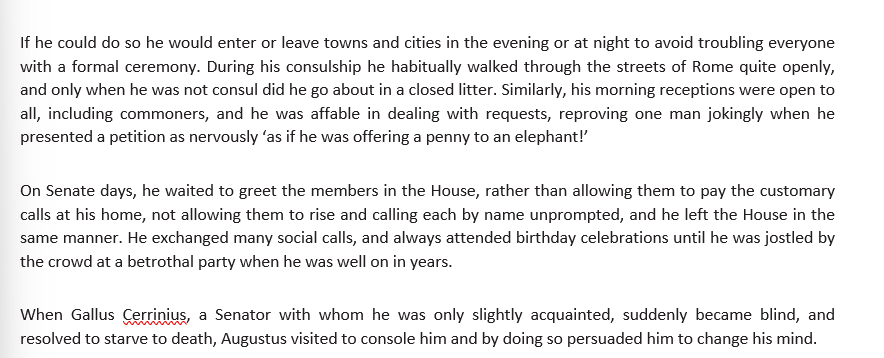
Give info from Suetonius bio about Augustus’ forum

What does the Res Gestae end with and what’s the significance of this?
Ends with an explanation of two of his most important titles.
Emphasized by the prominent positioning and extended explanation of how these tittles were conferred upon him and how they were displayed to the public,

Did Augustus really free the sea from pirates? Res Gestae.
Sextus pompus is reffered to as a pirate to mitigate civil war mentions

Does Augustus reinforce his name a lot in the Res Gestae?
Yes. Obvs why but also titles were important in these times.

Is Augustus’ generosity emphasized in the Res Gestae?
From his own wealth, not tyrinacal.
Lots of temples, taking care of religion and public spaces.
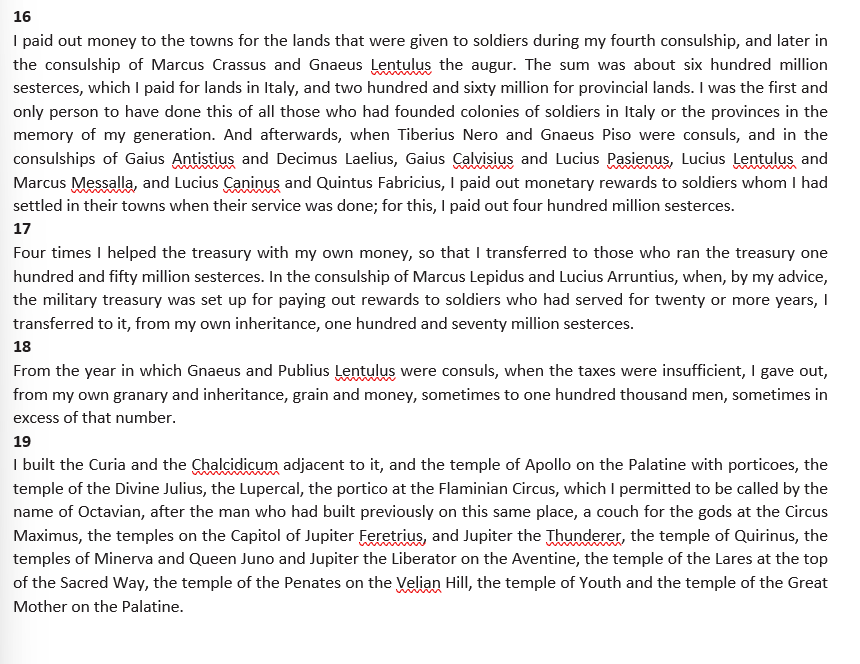
Does Augustus mention his consulships a lot in his Res Gestae?
Yes obvs.
Whole load of em - Adds to impressiveness, good leader, successfulness, facts and figures
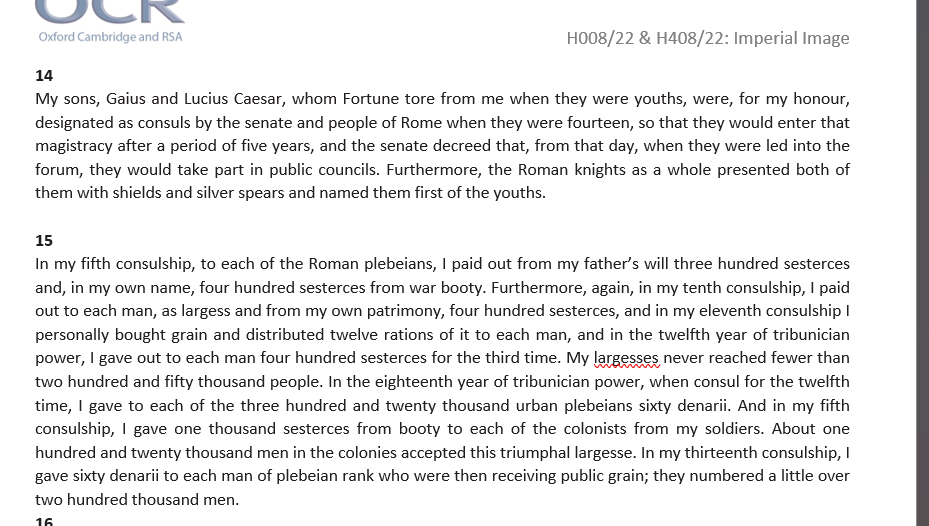
Does the Res Gestae only feature the war and conflict aspects of Augustus’ lifeitime?
No
Despite the fact that much of it is concerned with his military victories, it doesn’t overall give the impression that his life was just dominated by this.
He reinforces the symbolic closure of the Janus temple to emphasize a theme of peace and his peaceful successes.

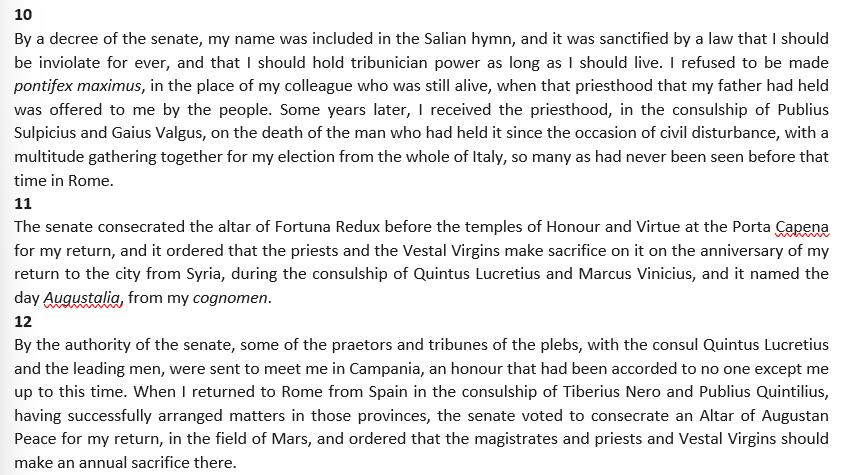
Does the Res Gestae mention the senate a lot?
Yes. Shows that he’s not tyrannical. Senate making the choices not just him (not actually what was happening obvs)
Common theme, remains constitutional legitimacy
Augustus is careful to make frequent reference to the senate and its magistrates.
Reinforced his image as a champion of the republic who held office only at the request of the senate.
At one point , he outright states that all his powers were based in the precedents set by the present generations ancestors.
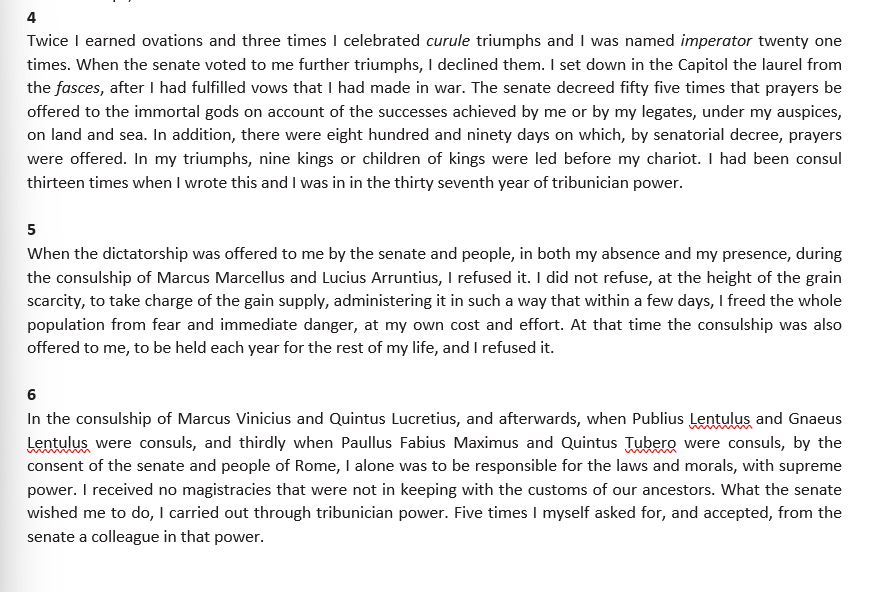
What’s Augustus’ writing style like?
minimal and straightforward, differs from other poets.
Most likely did this cuz he knew it would be transcribed, easy read of his achievements
Every word would have been expensive to carve but this could have also just been his writing style
What’s unusual about the Res Gestae?
Not unusual for Roman nobleman to commission an elogium on their death but the length was unusual. Almost 2500 words. Longest funerary inscription of the time.
Focuses almost entirely on Augustus, doesn’t mention his family / relatives a lot. In Roman society it was customary for at least a portion of the funerary inscriptions to be spent on these matters.
Augustus also seemed to address this to the people of Rome rather than the empire. Public works are exclusively took place in Rome. Despite this, the res geastae was produced and displaced throughout the empire and Rome.

What can be said about this? - Res Gestae
Emphasizes his involvement. Taking sole credit most of the times. Etc.

What can be said about this? - Res Gestae
Shows commitment. Refusal to name those makes readers forget they were senators and his controversial beginning consulship. Ceaser only named twice in this elogium - duh.

What can be said about this? - Res Gestae
Shows clementia, similar to Caesar. Slight civil war mention as to not completely disregard it.
Res Gestae - What’s left unsaid
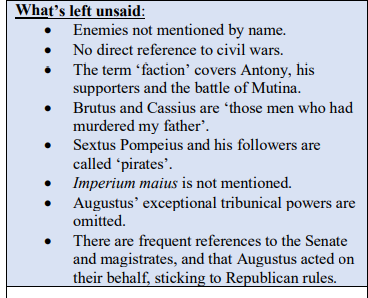
Horace a toast to actium - whats left unsaid
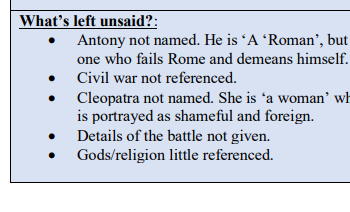
Horace’s cleopatra - techniques used
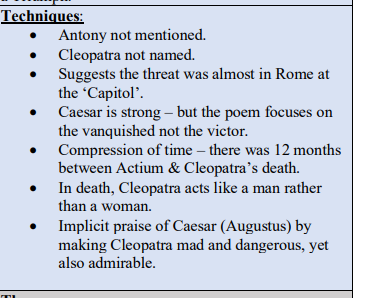
Horace’s moral decadence - summary
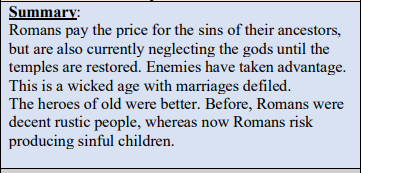
Horace Odes 3.14 Augustus Returns - summary
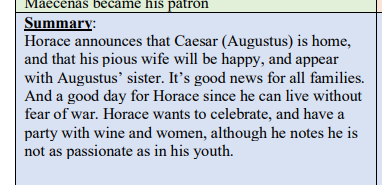
Horace Odes 3.14 Augustus Returns - public / private confusion
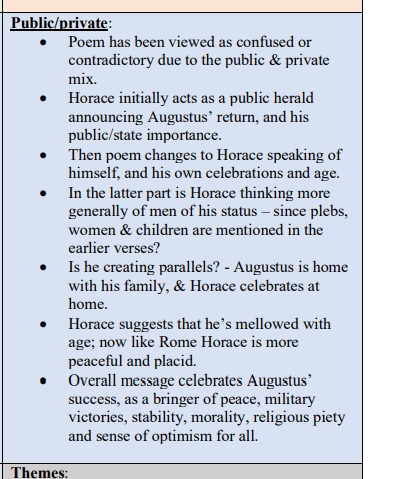
Horace Odes 4.4 Drusus and the Claudians - Summary
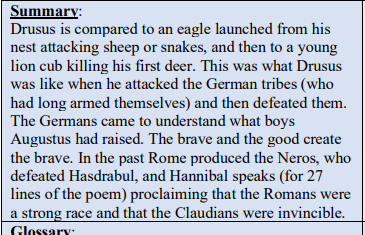
Horace Odes 4.4 Drusus and the Claudians - Drusus and Tiberius + Claudians context
Poem celebrates members of illustrious patrician families – the Claudians and the Neros – from whom members of the Imperial family were descended
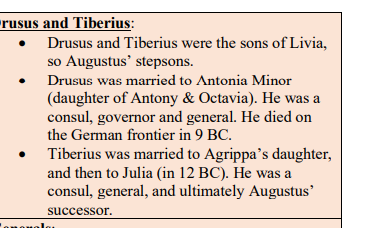
Horace Odes 4.15 To Augustus - Summary
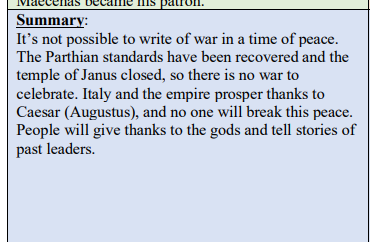
Horace Odes 4.15 To Augustus - Golden age
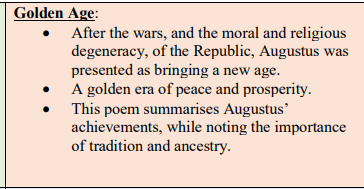
Horace, Carmen Saeculare - summary
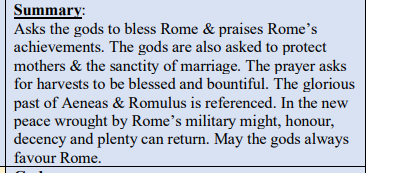
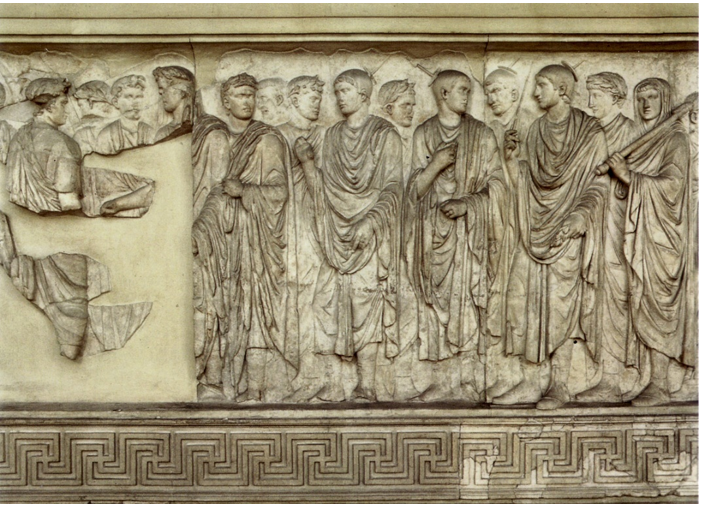
The Ara Pacis - The South Wall: The Imperial Procession
• A Frieze depicting a religious procession is found on the upper sections of the two outer side walls of the precinct. • Nearly 50 figures are depicted. • Some have been identified, and include Augustus, Agrippa & Livia. • Also represented are lictors (carrying the fasces), and priests wearing distinctive caps. • Several children – thought to be members of the Imperial family – are also shown. • Augustus wears a toga, so presented as a civic rather than military leader.
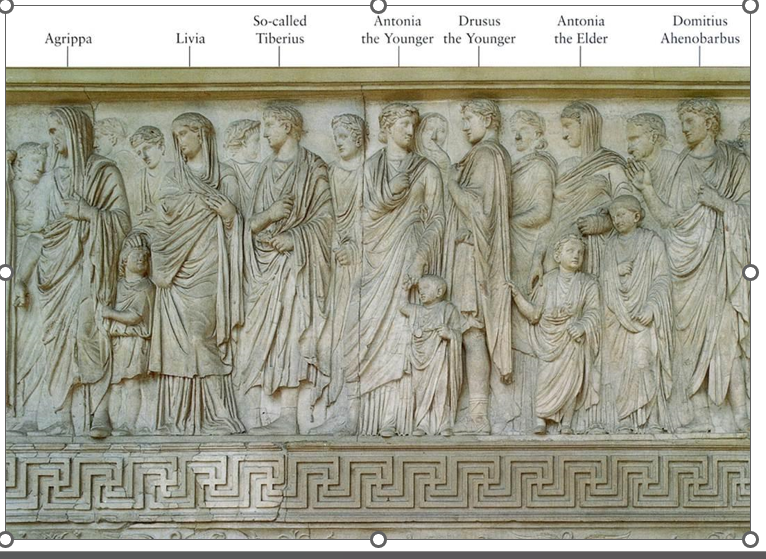
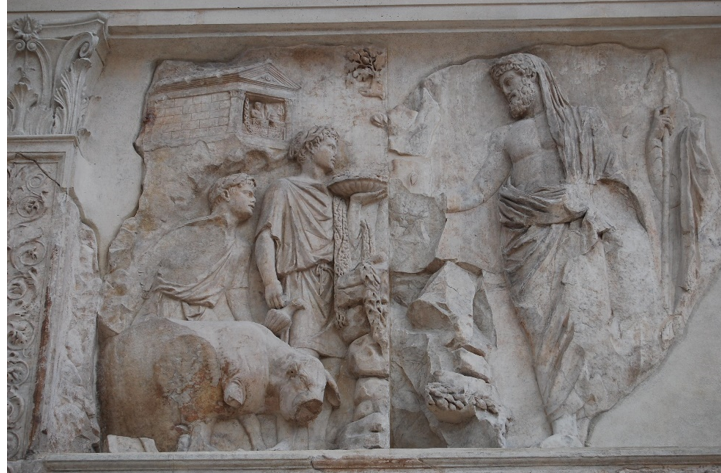
The Ara Pacis - The West Frieze: Aeneas Sacrificing
• Male figure (to the right) thought to be Aeneas, with his head covered in sign of religious ritual. • May represent Aeneas sacrificing pigs to the household gods of Troy, when he first arrived in Italy.
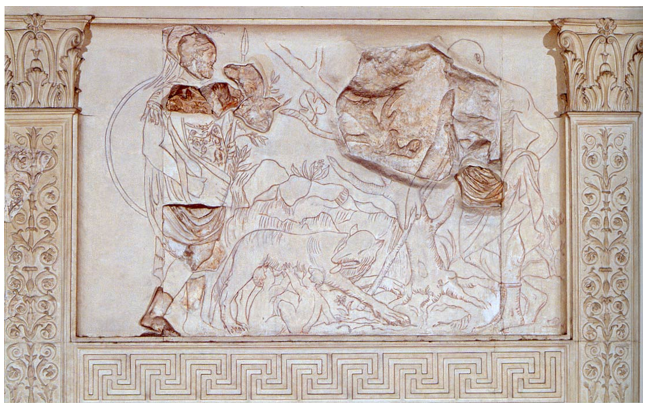
The Ara Pacis - The West Frieze: Romulus, Remus, the Wolf & the Shepherd
• Badly damaged. • There are remains of two sculpted male figures who may represent Mars (left) and the shepherd Faustulus (right). • Between these figures may have been the she-wolf suckling Romulus and Remus.
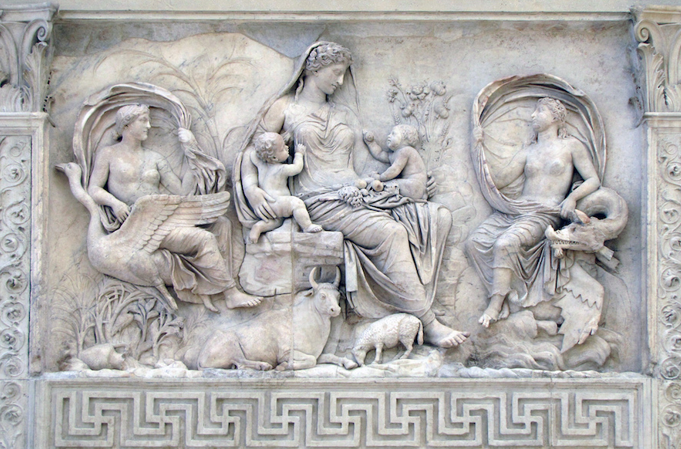
The Ara Pacis - The East Wall: Roma with (?) Honos & Virtus/ Tellus (?)
• A central seated female figure. • With two infants on her lap, and animals at her feet. • Flowers & plants behind. • The central figure is flanked by female figures who may represent the sky (to the left, seated on a swan) and sea (to the right, seated on a sea creature). • The central figure is thought to be Tellus (earth-mother goddess). Alternative suggestions are Ceres, Venus, Pax, and Livia.
• Panels covered with plant life. • Some small animals, e.g. snakes, birds. • Main plant represented is acanthus, which is interwoven with vines, which then change into other plants. • Symmetrical patterns may reflect strict order of Augustan regime. • Overall the panels suggest fecundity, fertility and plenty.
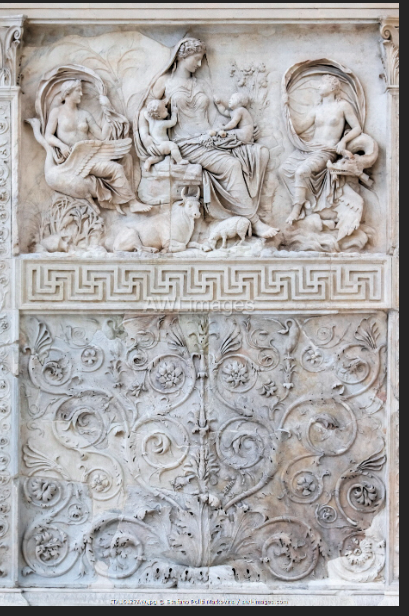
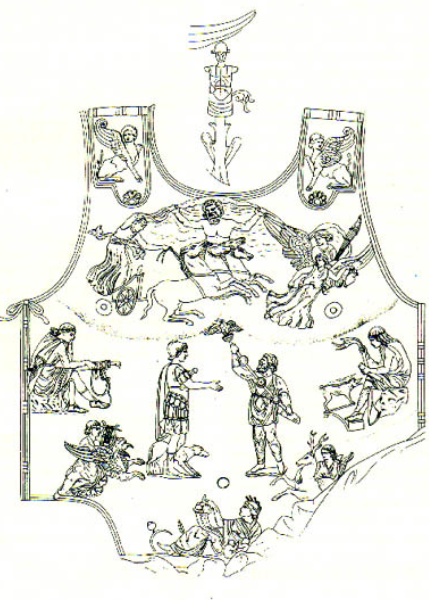
Analysis of the Prima porta statue
forget dress part
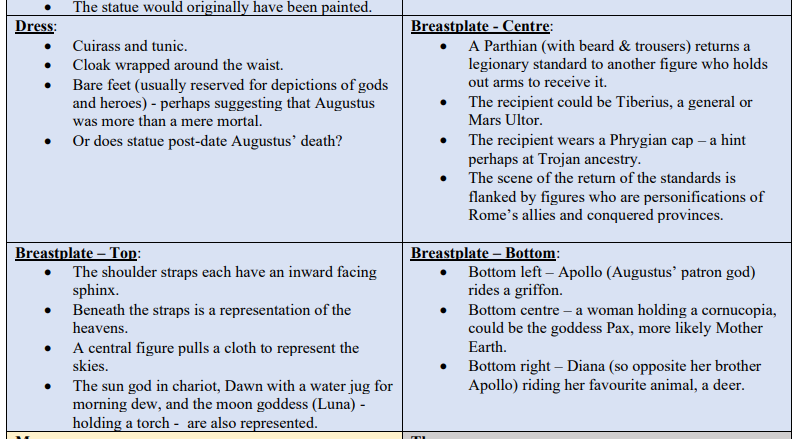
Propertius Elegies 3.4 War and Peace - Key messages
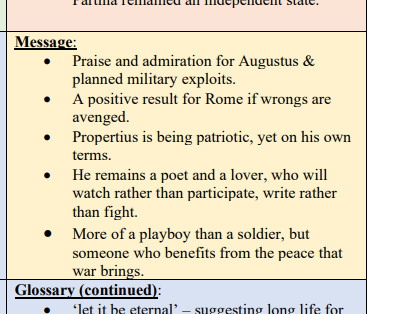
Propertius Elegies 3.11. Woman’s Power - Summary
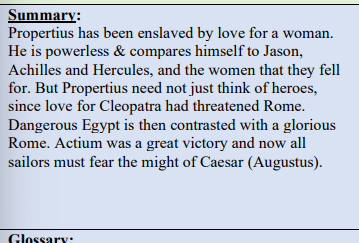
Propertius Elegies 3.11. Woman’s Power - Key messages
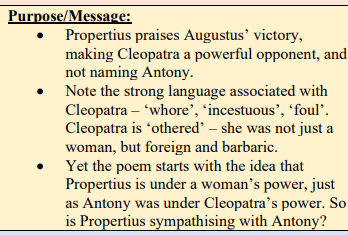
Propertius Elegies 3.12 Chaste and faithful Galla - Key messages
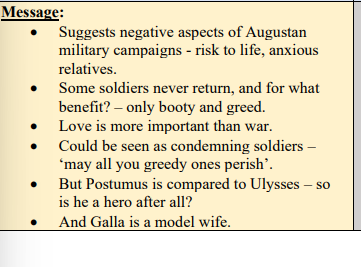
Propertius Elegies 4.6. The Temple of Palatine Apollo - Key messages
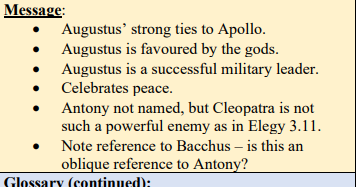
Propertius Elegies 4.6. The Temple of Palatine Apollo - Summary
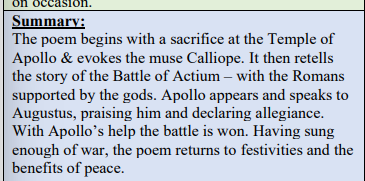
Ovid Metamorphoses - Message
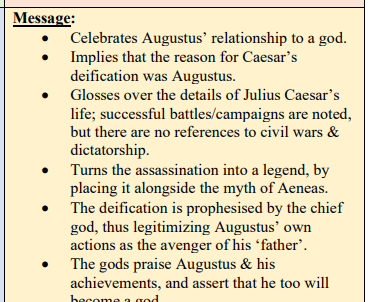
Suetonius Life of Augustus - Key messages
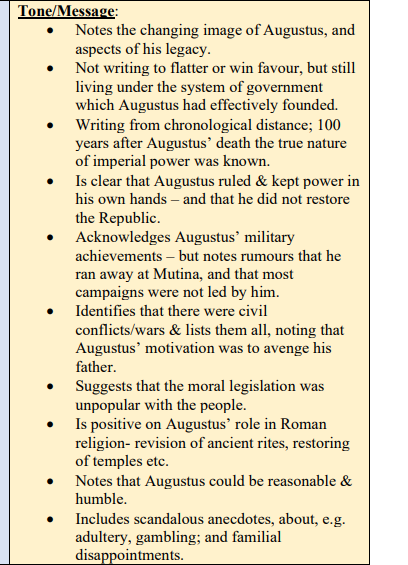
Suetonius Life of Augustus - Sources he used
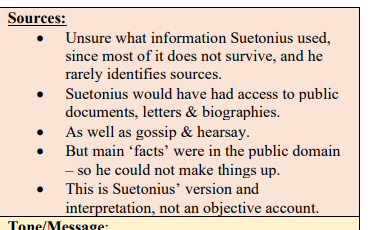
Augustus scroll coin - Key messages
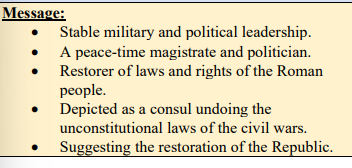
Gaius and Lucius coin - Key messages\
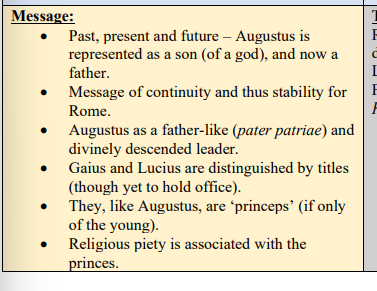
Define Divi Filius
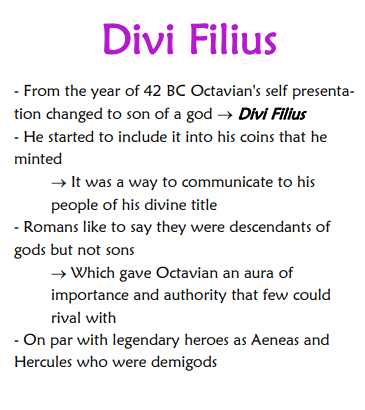
How did Octavian position himself as Apollo’s favourite
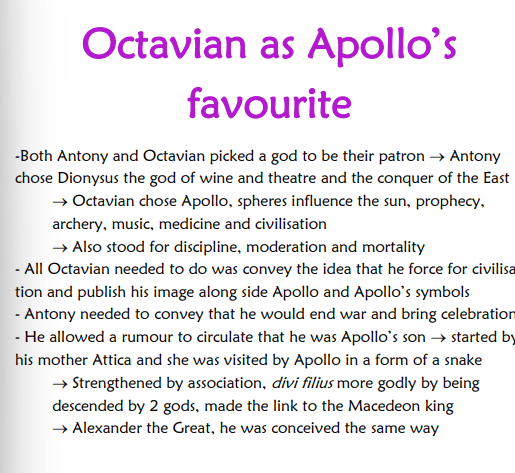
How did Octavian justify the civil war? - ma and cleo
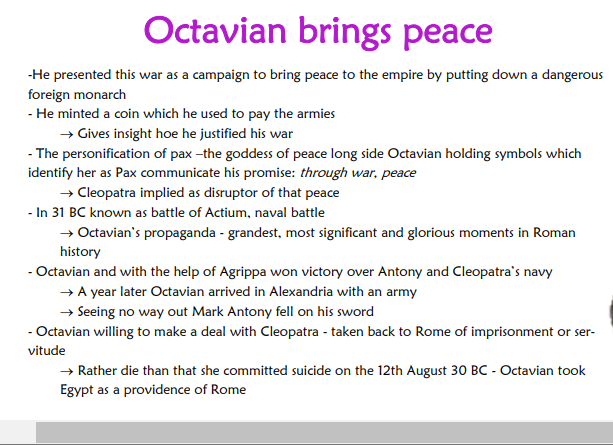
Octavian’s military triumps
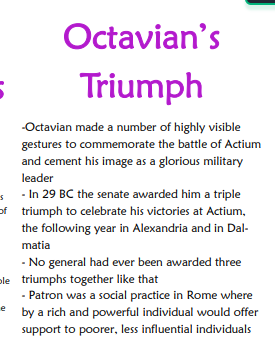
Augustus the Religious Leader
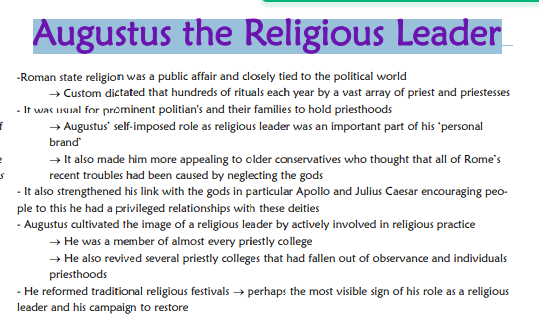
Augustus saves the Republic
-Octavian is remembered as the man who once and for all ended the Roman Republic and established the Principate
→ In his lifetime Octavian presented the idea that he had saved the Republic from ambitious politics and destructive wars
-When Octavian was rising for power he head been given a number of powers by the Senate which went against tradition
→ For example he had been committed to the Senate and held the consulship too young, commanding armies before hiding office, as a triumvir he had suspended courts and free elections
→ Octavian has used these powers to tighten his grip on power
→ Such powers could make him look like a tyrant
- In 28 BC Octavian had the senate elect him a princeps senatus
→ This allowed him to speak first in the Senate, direct actions to an extent
→ He also continued to hold the constitutional position of consul
-With these powers Octavian officially relinquished al the unconstitional powers he held in 27BC
→ This is referred to as the First Settlement which signalled that he unlike Julius Caesar would not hold absolute power indefinitely
-To the public he was a hero who had kept his extraordinary powers just long enough to nav- igate Rome through a period of crisis before returning to his natural role as a member of the Senate → however Octavian barely lost any power at all
-Through the role as consul he was able to direct the activities of the Senate throughout his career → he often had them vote to give him more power
- It was his personal fortune that allowed him to influence elections and to act as patron for the great and good of Rome
-He had no longer control of an army, his veterans were loyal to him and through local com- manders → such as Agrippa
-In the response to the return of his powers, the senate granted Octavian a number of honours
→ They bestowed upon him the civic crown for having brought an end to civil wars
→ They also gave him control of the providences of Spain, Gaul, Egypt and Syria
→ This gave him control of gain supply
-He was referred to as Princeps which means leading man→ an honour that gave no actual power but that implied is role as leader in Rome
-The Senate also commissioned a golden shield - Clipeurs Nirtutis - engraved with his four car- dinal virtuis
→ The shield was displayed prominently in the Senate House
→ Replicas were made and distributed throughout the Empire and representations of the shield appeared on coins
- Another significant honour granted to him by the Senate was a new name - Augustus → It means to increase, to enrich or to praise
→ Augustus was a title linked to lares, Rome's household gods
-This name change which emphasised religious duty and pietas, sealed Octavian's attempts to rebrand himself
- From this point onwards - in theory - began the benevolent rule of Augustus
the reality of the military victories, including the involvement of Agrippa
